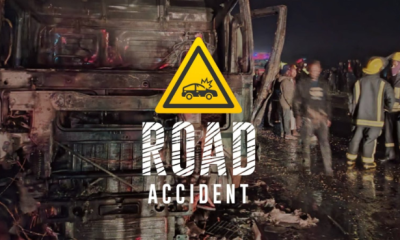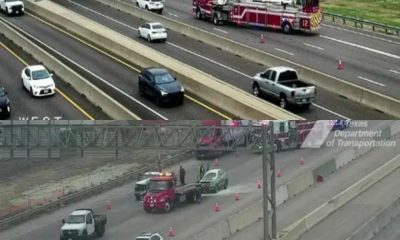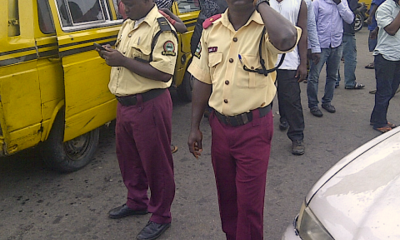News Update
Lagos Launches 24-Hour Traffic Operation Ahead of Festive Season

Lagos has always been a city in motion, a city where the sound of car horns becomes a daily soundtrack, where traffic defines time, and where the road is both a lifeline and a battlefield.
Also Read: Lagos Launches Citywide Transport Perception Survey to Revolutionize Mobility Planning
But as the “ember months” September through December roll in, the stakes rise. Fatal crashes, reckless speeding, and night-time chaos often peak during this period as motorists rush to meet year-end targets.
This year, however, the Lagos State Government says enough is enough.
In an unprecedented move, it has launched a 24-hour traffic management operation across the metropolis, a round-the-clock deployment of LASTMA, FRSC, and other agencies to enforce sanity before the holiday season begins.
The initiative, dubbed “Operation Ember Months Stability”, marks Lagos’ biggest traffic safety campaign in over a decade and could determine whether the city enjoys a festive season of movement or one marred by mayhem.
Speaking at a press briefing at the Alausa Secretariat, the General Manager of LASTMA, Mr. Bakare-Oki Olalekan, confirmed that officers will now work in shifts that cover both day and night patrols.
“We are entering a high-risk travel period. The ember months historically record more accidents, congestion, and reckless driving. This 24-hour operation will help restore discipline and ensure free traffic flow throughout Lagos,” he said.
The agency revealed that all major routes, including the Third Mainland Bridge, Lekki-Epe Expressway, Apapa-Oshodi Expressway, and Lagos-Ibadan corridor, will see intensified monitoring.
According to FRSC records, October to December account for nearly 37% of all annual road crashes in Nigeria.
This spike is caused by three main factors:
- Increased vehicular movement: People travel more for family events and trade.
- Driver fatigue and impatience: Commercial drivers push long hours for extra income.
- Overloading and poor maintenance: More goods are moved, often beyond vehicle limits.
“Traffic is not just a nuisance — it’s a life-and-death issue,” said Mrs. Abimbola Odejimi, a road safety researcher. “The same impatience that causes gridlock also kills people.”
Under Operation Ember Months Stability, the Lagos State Government has mapped out a comprehensive strategy that covers enforcement, emergency response, and public education.
1. 24-Hour Surveillance
CCTV traffic cameras now monitor key intersections, supported by patrol units that relay live footage to a central control room.
2. Strategic Deployment
Officers will be stationed in high-traffic corridors:
- Mile 2 – Orile – Apapa axis
- Ojota – Ketu – Berger corridor
- Lekki Phase 1 to Abraham Adesanya
- CMS to Ajah
- Agege – Abule Egba – Iyana Ipaja
3. Multi-Agency Coordination
The Lagos Traffic Radio (96.1 FM), Police, and FRSC will share real-time updates. Emergency response is now linked to the Lagos Response Unit (LRU) for quicker crash rescue.
4. Road Discipline Crackdown
LASTMA has reactivated mobile courts to prosecute offenders on-site, including red-light runners, one-way violators, and overloaded vehicles.
5. Night Patrols and Lighting
To combat dark-route accidents, solar-powered lamps are being installed at known blackspots like Ijora, Oshodi, and Abule Egba.
A Walk Through Lagos Traffic — The RoadKing Experience
On November 5, the RoadKing.ng team joined a night patrol from Oshodi Terminal to Mile 12, observing how officers manage late-night traffic.
At 9:47 p.m., the city was alive — bus horns, danfo conductors shouting destinations, and truck drivers navigating tight lanes.
By 10:15 p.m., two tankers had broken down at Cele Bus Stop, creating a ripple of congestion. Within 20 minutes, a LASTMA truck arrived with floodlights, and officers manually directed vehicles until flow resumed.
It wasn’t perfect — but it was progress.
“We’re not just controlling traffic; we’re preventing deaths,” said Officer Yusuf Adewale, one of the patrol leaders. “A small delay can become a big tragedy if people panic or overtake dangerously.”
Motorists and commuters have welcomed the move but remain skeptical about consistency.
“We’ve seen campaigns before,” said Mrs. Funmi Ogunde, a private driver. “They work for two weeks, then everyone relaxes again. We hope this one lasts.”
Bus drivers at Ojota expressed mixed feelings:
“Night operation go help, but dem go tire quick,” said Azeez ‘Smallie’ Balogun, a danfo driver. “Lagos no dey sleep — na traffic wey dey rest sometimes.”
The Federal Road Safety Corps (FRSC) has endorsed Lagos’ 24-hour operation, urging other states to replicate it.
Sector Commander Mr. Babatunde Adeyemi said:
“If every state maintained continuous traffic surveillance, crash fatalities would reduce drastically. Lagos is setting a good example.”
He added that FRSC patrols will coordinate with LASTMA for joint enforcement during peak travel weekends.
Every city has congestion, but Lagos’ brand of gridlock is unique, a mix of human impatience, infrastructural strain, and cultural defiance.
RoadKing’s research identifies five root causes of Lagos’ perpetual traffic problem:
- Lawlessness: 60% of congestion is due to driver indiscipline.
- Mechanical failures: 20% stems from poorly maintained commercial vehicles.
- Infrastructure bottlenecks: Narrow roads and construction zones add 15%.
- Enforcement fatigue: Officers often work without adequate rest or equipment.
- Night-time hazards: Dimly lit roads and unmarked tankers create silent killers.
This 24-hour initiative directly targets at least three of these causes, if sustained.
At Berger, RoadKing.ng spoke with long-distance drivers and commuters.
“If they can keep the night roads safe, it will reduce robbery and crashes,” said Sunday Orji, a trailer driver heading to Ibadan.
“We are tired of seeing bodies by the roadside every weekend,” added Kemi Adigun, a commercial bus conductor. “Anything that stops that, we support am.”
According to the 2025 FRSC Traffic Safety Report, Lagos recorded:
| Category | January–September 2025 | 2024 (Full Year) |
|---|---|---|
| Road Crashes | 1,624 | 2,010 |
| Fatalities | 411 | 527 |
| Injuries | 1,398 | 1,911 |
| Major Cause | Speeding & Reckless Driving | Same |
Officials believe the 24-hour enforcement could reduce crash frequency by up to 25% before year-end.
While the initiative is ambitious, experts warn of key challenges:
Officer Fatigue
Continuous deployment risks burnout among traffic officers already working long hours in harsh conditions.
Limited Equipment
Many patrol vehicles are outdated, lacking communication gadgets and functional sirens.
Funding Sustainability
Without steady budget allocation, the operation might fizzle out after December.
Public Resistance
Lagosians have grown accustomed to bending road rules; changing behavior may take more than fines.
Cities like Nairobi, Johannesburg, and Dubai operate similar 24-hour traffic management models but with key differences:
| City | Enforcement System | Result |
|---|---|---|
| Nairobi | Real-time CCTV & night patrols | 30% drop in crashes in 2 years |
| Johannesburg | Community-driven traffic reporting | 22% faster response to accidents |
| Dubai | AI-controlled signals + strict night enforcement | 50% fewer fatalities since 2019 |
Experts say Lagos must blend technology with human enforcement, using drones, AI traffic sensors, and community tip-offs to truly sustain the plan.
Editorial Opinion: A Turning Point — If Lagos Stays the Course
RoadKing.ng believes Operation Ember Months Stability could become a defining moment in Nigeria’s traffic safety history, if it doesn’t fade into bureaucracy.
For decades, Lagosians have normalized traffic deaths as statistics, not stories. Every week brings headlines: “Bus plunges off bridge,” “Tanker fire kills commuters,” or “Reckless driver kills pedestrian.”
This new operation attempts something rare, prevention instead of reaction.
It puts officers where they’re needed most, when they’re needed most at night, when discipline vanishes and danger thrives.
But success will depend on one thing: continuity.
If this operation ends when the holiday lights go off, then Lagos will be right back where it started in darkness.
RoadKing Recommendations
- Create a Permanent 24-Hour Command Center for traffic emergencies and live reporting.
- Integrate GPS-based driver tracking for commercial buses and tankers.
- Incentivize compliance — reward drivers with clean records through tax rebates or insurance discounts.
- Empower citizen participation via RoadKing Traffic Watch, an idea under review for public reporting of violations.
- Publicize night patrol success stories to build trust between motorists and officers.
Lagos’ new 24-hour traffic operation is more than a policy, it’s a test of political will.
It asks a simple but powerful question:
Can Africa’s busiest city control its roads before the roads control it?
If this operation sustains momentum through December, it could save hundreds of lives and perhaps become a model for other Nigerian cities battling the same chaos.
For now, Lagos stands at a crossroads literally and figuratively.
And as the sun sets and the city lights up, one truth remains clear:
Traffic control doesn’t sleep, because Lagos never does.























